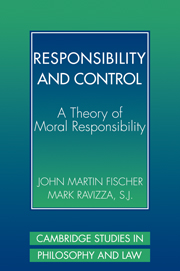Book contents
- Frontmatter
- Contents
- Acknowledgments
- 1 Moral Responsibility: The Concept and the Challenges
- 2 Moral Responsibility for Actions: Weak Reasons-Responsiveness
- 3 Moral Responsibility for Actions: Moderate Reasons-Responsiveness
- 4 Responsibility for Consequences
- 5 Responsibility for Omissions
- 6 The Direct Argument for Incompatibilism
- 7 Responsibility and History
- 8 Taking Responsibility
- 9 Conclusion
- Bibliography
- Index
6 - The Direct Argument for Incompatibilism
Published online by Cambridge University Press: 05 June 2012
- Frontmatter
- Contents
- Acknowledgments
- 1 Moral Responsibility: The Concept and the Challenges
- 2 Moral Responsibility for Actions: Weak Reasons-Responsiveness
- 3 Moral Responsibility for Actions: Moderate Reasons-Responsiveness
- 4 Responsibility for Consequences
- 5 Responsibility for Omissions
- 6 The Direct Argument for Incompatibilism
- 7 Responsibility and History
- 8 Taking Responsibility
- 9 Conclusion
- Bibliography
- Index
Summary
INTRODUCTION
In Chapter 1 we pointed out that there are two sorts of arguments for the incompatibility of causal determinism and moral responsibility: Indirect and Direct. The Indirect Arguments first seek to show that causal determinism rules out alternative possibilities. Then they conclude that causal determinism rules out moral responsibility, insofar as moral responsibility requires the kind of control that involves alternative possibilities. We have contended that the indirect arguments fail, because moral responsibility (for actions, omissions, and consequences) does not require the sort of control that involves alternative possibilities.
Now it is time to turn to the Direct Argument for the incompatibility of causal determinism and moral responsibility. It is interesting that the sorts of considerations that led us to reject the Indirect Arguments will also lead us away from the Direct Arguments. That is, Frankfurt-style examples will here play a significant role, as they have in previous chapters.
THE DIRECT ARGUMENT FOR INCOMPATIBILISM
The Direct Argument uses a principle structurally similar to the principle employed in the modal version of the Indirect Challenge to moral responsibility: the Principle of the Transfer of Powerlessness.
- Type
- Chapter
- Information
- Responsibility and ControlA Theory of Moral Responsibility, pp. 151 - 169Publisher: Cambridge University PressPrint publication year: 1998



